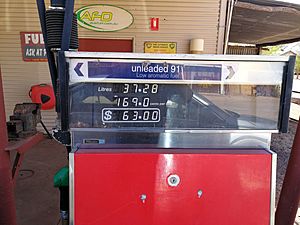Opal (fuel) facts for kids
Opal is a special type of fuel developed in 2005 by BP Australia. It was created to help protect people in remote Indigenous Australian communities. This fuel is designed to be much safer than regular petrol.
Even though Opal fuel costs a bit more to make, it saves a lot of money in the long run. A report from 2006 showed that it could save at least $27 million each year. This is because it helps avoid many health and social problems linked to the misuse of fuel.
A government report in 2010 found that Opal fuel made a big difference. It was introduced in 106 communities across Australia. In these places, the harmful misuse of fuel dropped by 70%. This shows how effective Opal fuel has been in making communities safer.
Contents
What Makes Opal Fuel Different?
Regular unleaded petrol has about 25% "aromatics." These are chemicals like toluene and xylene. These chemicals can cause harmful effects if the fuel is misused.
How Opal Fuel is Safer
Opal fuel is different because it has only 5% aromatics. This means it has much less of the chemicals that can cause harm. Because of this, Opal fuel is a safer choice for communities.
The Australian Government helps pay for Opal fuel to be available. They also limit how much regular unleaded petrol is sold in some remote areas. This helps ensure people use the safer Opal fuel.
Benefits for Cars
BP, the company that makes Opal, says that cars using Opal fuel are less likely to have a problem called "vapour lock." Vapour lock happens when fuel turns into a gas too quickly in the fuel lines. This can make a car stop running. Opal fuel's special design helps prevent this.
Before Opal Fuel
Before Opal fuel was created, another type of fuel called Comgas was sometimes used. Comgas is a type of aviation fuel (fuel for airplanes). It was used in some communities to discourage the misuse of fuel.
Why Comgas Was Replaced
However, Comgas had a problem. It contained a poisonous substance called tetraethyllead. This substance is harmful to people and also damages parts of cars called catalytic converters. Catalytic converters help clean car exhaust. Because of these dangers, tetraethyllead is now banned for use in cars in most parts of the world. Opal fuel is a much safer and better alternative.
See also
 | May Edward Chinn |
 | Rebecca Cole |
 | Alexa Canady |
 | Dorothy Lavinia Brown |


